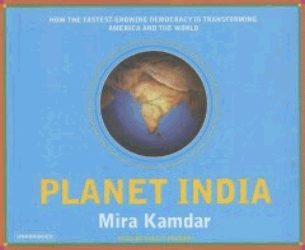

|

KWR Book Reviews Mira Kamdar, Planet India: How the Fastest-Growing Democracy is Transforming America and the World (New York: Scribner, 2007), pp.320. $26.00 Reviewed by Scott B. MacDonald
According to Mira Kamdar, a Senior Fellow at the World Policy Institute and an Associate Fellow of the Asian Society, India is on the rise, very much plugged into globalization, and is increasingly a pivotal player in a changing international system. In her Planet India: How the Fastest-Growing Democracy is Transforming America and the World, Kamdar emphasizes that the soft power of the South Asian country, the appeal of its democratic system, and growing economic success make it an exciting counterpart to more authoritarian China and a far more affluent (and wasteful and materialistic) United States. As she states: "From combating global terror to finding cures for dangerous pandemics, from dealing with the energy crisis to averting the worst scenarios of global warming, from rebalancing stark global inequalities to spurring the vital innovation needed to create jobs and improve lives - India is now a pivotal player. The world is undergoing a process of profound recalibration in which the rise of Asia is the most important factor: India holds the key to this new world." Kamdar undertook Planet India "because I believe India matters as never before to a world in crisis." The main thrust of Planet India is that the old Western dominated world order is in decline - as reflected by severe environmental problems, a scramble for natural resources, global terrorism, extreme inequity, and the spread of AIDS/HIV. While the West has a high standard of living and remains an attractive pole for people around the world, the expensive nature of Western society cannot be easily replicated around the planet. Consequently, another model is needed and India fills that role. According to Kamdar: "India's goal is breathtaking in scope: transform a developing country of more than one billion people into a developing nation and global leader by 2020, and do this as a democracy in an era of resource scarcity and environmental degradation." This is obviously a tall order. While Planet India is very much an India-First book, it clearly points to all the soft underbelly problems of corruption, poor infrastructure, socio-economic inequality, water shortages, disease, and pollution. For example, Kamdar notes: "India is a potential hotbed of the planets most lethal pandemics. It is also rapidly becoming the capital of non-communicable epidemics, with rates of diabetes and heart disease as well above global averages." She also takes into consideration problems such as poor treatment of girls, dalits, and others, not to mention Hindu/Muslim tensions that all threaten to derail Planet India. Despite the multitude of problems confronting India, there is a very active desire to change things. Since the early 1990's reforms have unshackled the economy, breaking out of a more socialistic development mode. This is where India offers an alternative mode of development between a wealthy and out-of-reach lifestyle in the West and a rapidly growing politically authoritarian China. According to Kamdar: "But India is also where there is perhaps the most hope of finding ways to deal with these and other scourges on a scale that could actually serve the world's billions. The high-cost regimens will only help a few of those afflicted. If India can find low-cost, convenient therapies, for example oral insulin therapies where patients don't have to inject themselves, the lives of millions of people will improve." Kamdar has written an interesting and topical book which most Americans should read, especially as India will increasingly become part and parcel of U.S. life - either through the growing numbers of Indians living and working in the United Sates, Indian products showing up in the market place, or jobs being offshored to Delhi or Mumbai. India's rise also provides, according to Kamdar, a historical opportunity for the U.S. in terms of a partnership: India and the United Sates, undoubtedly two of the world's great democracies, have a real opportunity to recall each other to the moral bedrock of our respective founding moments; to turn away from rampant militarism and save our environment." There is a growing sea of ink being spilled to cover the rise of India. Planet India is clearly one of the more noteworthy additions and is strongly recommended. Review of Chen Guidi and Wu Chuntao, Will the Boat Sink the Water? The Life of China's Peasants, (New York: Public Affairs, 2006). Reviewed by Dale Smith
The life and welfare of China's peasants is of current international interest for several reasons, not the least of which are their revolts against onerous taxes and corruption throughout Chinese history. Chen Guidi and Wu Chuntao's book Will the Boat Sink the Water? The Life of China's Peasants is an interesting description of the trying times China's peasants have had since 1990. The book is loosely divided in two parts. The first chapters of the book are detailed journalistic investigations of specific tax and corruption problems experienced by several villages in Anhui province, one of the poorest in China. Problems found in this province are endlessly repeated across China. Taxes and fees, which are collected at the local level, are often larger than those mandated by the central government, with one-time fees such as building permits, collected in multiple years. Villagers are faced with tax collectors who keep two sets of books, one to show officials from the central and provincial government, and another that shows the actual taxes imposed on the villagers. In some ways, the central government exacerbates the problem. Well-meaning directives to reduce the tax burden on the peasants are routinely ignored, as local officials depend on tax collections for their salaries, are able to hire at will, and are able to raise their own salaries via illegal taxation. While the central government has educated the villagers regarding their rights, those who exercise their rights to complain about unfair taxation are often arrested on false charges, assaulted, or both. Villagers who ask for audits, which are occasionally ordered based on their complaints, are subject to harassment and occasionally murder at the hands of local officials. On occasion, villagers petition the central government directly in Beijing, or at the provincial level. Many of these complaints are forwarded to the provincial, township, and county level for action, resulting in officials investigating themselves or their partners in corruption. There are also reports of villagers renewing the age-old tradition of throwing themselves under the carriages (automobiles) of high officials, in order to attract attention to their plight. Local officials are known to collect a "bad attitude" tax from those who complain. The second part of the book reads more as a sociological study than the journalistic treatments of earlier chapters. The tax burden on the rural, mainly agricultural population in 2000 averaged $18.63 per capita, compared to the average urban dweller's tax burden of $4.89 per capita, in spite of the fact the city dweller's income was on average six times that of the rural dweller's income. A 2004 report in Asia Times Online reports per capita income of $317 for farmers, and $1,000 per capita for urban dwellers, and rural incomes have fallen in real terms since 1998. Resident permits, which chain the peasants to the countryside, are often a tool used to keep peasants from traveling to complain in provincial capitals and Beijing. In spite of the permit system, many villagers seek work in urban areas, which reduces much-needed human capital and knowledge in rural areas. Rapid industrialization, pollution, and the Great Leap Forward have resulted in millions of acres of farmland taken out of production. Huan Kuan, an author of the Han dynasty (206 BCE - 220 CE), wrote in his treatise On Salt and Iron, that society does not suffer from a lack of laws, but from a lack of enforcement or implementation. It is clear from occasional media attention, official Party investigations, and public statements by China's premiers, that the Party wants to reduce the level of corruption, but is having trouble implementing its directives at the county, township, and village levels. The bureaucracy has enlarged greatly since 1980, and these officials have to be paid from taxes collected at the local level. The weakness of the system is illustrated by the imposition of the death penalty for corruption and the inconsistent responses of the central and provisional governments to complaints from the local level. As reported in the Asia Times Online on December 22, 2006, the central government has proposed a restructuring of the anti-corruption system along the lines of Hong Kong's Independent Commission Against Corruption, making the provincial watchdogs more independent of the local party head. The plan is likely to be endorsed at the upcoming Party Congress. In early 2004, roughly two months after publication, Chen and Wu's book was banned in China, although millions of ersatz copies circulate. Chen was dismissed from his position as a journalist, and the authors were forced to relocate from their village after one of the officials named in the book sued them for libel. It is far from certain that the truth is a defense against libel of a Party official, as the courts are firmly under the Party's control. In spite of this, the authors evidently cooperated in the translation and publication of their book in English to garner a wider readership. Chen and Wu's book illustrates the events underlying the government's admission in early 2007 that there were over 80,000 protests in 2006. Doubtless, this number is understated. Will China's peasants once again reprise their historic role, and, ironically, be the force that brings down the Chinese Communist Party? Only time will tell. While there are enormous business opportunities in China, and some, but nowhere near a majority of the trends are positive, anyone seeking to invest in China should go in with their eyes wide open, preferably after reading this book.
|

